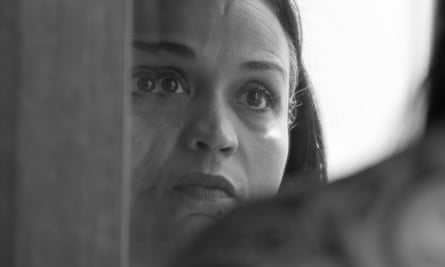The American film-maker Garrett Bradley premiered her first nonfiction feature, Time, at the Sundance film festival last year, where she became the first black woman to win the directing award. The documentary, about a mother campaigning for her husband’s release from prison, has since received multiple accolades.
Before Garrett Bradley premiered her documentary Time, which has received a slew of nominations over the past 14 months including for the Oscar for best documentary, she didn’t have much experience with awards ceremonies. She went to the Gotham awards in 2014 with her debut feature, Below Dreams, but she didn’t win that night. Even so, the event was “beautiful”, she recalls. “There were lots of tables with gorgeous flowers and all different types of silverware, and people I was used to seeing in magazines.”
With Time, which follows an African-American family dealing with the trauma and injustices of long-term incarceration, the 35-year-old has been negotiating an entirely different kind of awards experience. From her couch in California, she has logged into 10 different events including the National Society of Film Critics Awards and the Gotham awards, where Time won best documentary. (Bradley also won best director in the US documentary category at Sundance, in February 2020, becoming the first black woman to pick up that award.)

“It’s a bit like a video game,” she says of the online ceremonies. “Sometimes you’ll see an interface that has different tables, and you’ll be jumping from one table to the next. And the funny thing is, you don’t know who’s going to be there. You click it and then you’re just in it, and there’s no getting out of that virtual table. But it’s kind of fun. You give in to the lack of control and look for new ways of finding social grace on the internet.”
The 11 awards Time has collected so far have been personally meaningful for Bradley, the daughter of New York artists who studied religion before becoming a full-time filmmaker. But she’s at pains to emphasise the collective nature of the project, sharing the awards not just with the film crew but also with the Richardson family of New Orleans who trusted her to tell their story. “To see that we’ve offered an entry point into the conversation around incarceration has been huge for all of us,” she says. “This is not a niche issue: this is a majority issue that affects the majority of people in America.”
Worst thing about an awards ceremony?
The rules. You can only get up at a certain time, you have to wear your outfit for a long period of time. It would be nice if it could be a bit more freeform.
Where do you keep your awards?
Right now they’re all in a suitcase. I’ve had the same suitcase since 2019. So I just carry them around with me.
What do you look for in an awards outfit?
I dressed up once [for an online ceremony] and it was really fun, because I only had to dress up from the waist up – below I was wearing sweatpants and no one knew. It was great.
